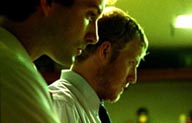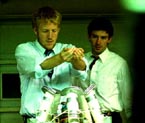Primer


Needs Another Coat of Something
I love micro budget movies. Even when they are failures, you have to admire the gumption of filmmakers who wear every hat in order to get their movie made. Some max out credit cards and dump all of their savings into realizing their vision. My favorite example of this is El Mariachi, Robert Rodriguez' $7000 action film that is still his best movie (and he sold his body to science to get his budget!).
Enter Shane Carruth. He has also spent $7000 on his movie, but perhaps should have saved it, or at least fired himself and hired someone else to rework his script. His head is covered with hats in his first movie, Primer (which won the Grand Prize at Sundance), an intriguing yet unfulfilling sci-fi tale that is ultimately crushed under the weight of its own self-importance.
 The film opens with four young engineers spending all their spare time in a garage trying to invent something. We're never told what this something is, but do hear a lot of techobabble about how to make it better. Two of the engineers (Carruth and David Sullivan) stumble on something special their machine apparently does. Stop reading now if you don't want the "plot" of Primer to be spoiled for you.
The film opens with four young engineers spending all their spare time in a garage trying to invent something. We're never told what this something is, but do hear a lot of techobabble about how to make it better. Two of the engineers (Carruth and David Sullivan) stumble on something special their machine apparently does. Stop reading now if you don't want the "plot" of Primer to be spoiled for you.What they have invented (in the ultimate of story contrivances) is a time machine. So, like anyone who would have done the same, they test it out. First to make money. Then to change events relating to a friend who was killed.
This movie has a lot of people talking, not because of the unique story, but because of the confusing narrative. The story is so fragmented, the timeline so disjointed, that any film geek (myself included) will dare themselves to watch it, to see if they can be one of the select few who "get" it. I can see how some will say this movie is brilliant, but just because you don't understand something, doesn't make it great--just, well, hard to understand.
Don't get me wrong, I have no problem will filmmakers who disturb the timeline to get us thinking. Memento and Eternal Sunshine of the Spotless Mind are two recent examples of non-linear stories that are challenging, inventive, rewarding, and (most importantly) contain empathetic characters. Carruth might want to study these films.
 Technically, the movie has some problems. The film is often grainy due to low light, the colors rarely match, and the sound ain't that great. The acting is pretty stiff (which I didn't mind since the characters are hardly developed), and solely exist to be pawns of the story. I suppose these could be called "artistic choices" or "documentary feel", but those seem more like excuses than anything else.
Technically, the movie has some problems. The film is often grainy due to low light, the colors rarely match, and the sound ain't that great. The acting is pretty stiff (which I didn't mind since the characters are hardly developed), and solely exist to be pawns of the story. I suppose these could be called "artistic choices" or "documentary feel", but those seem more like excuses than anything else.There are some great ideas floating around in this nebulous brine. I liked the idea that if you wanted to travel back six hours, you had to sit in the time machine for six hours. I liked the idea when you knew you were going to travel back, you hid somewhere for the day, so when you came back, you wouldn't run into yourself. Had these ideas been refined in a more coherent story, Carruth might really have something.
I will give Carruth credit, his film is compelling, as it had my friend and I talking in the theater for at least 10 minutes after the credits rolled. Ultimately however, Primer feels like a shell game. No matter how hard you try to follow the pea, your five bucks is still gone, and you have little to show for it.